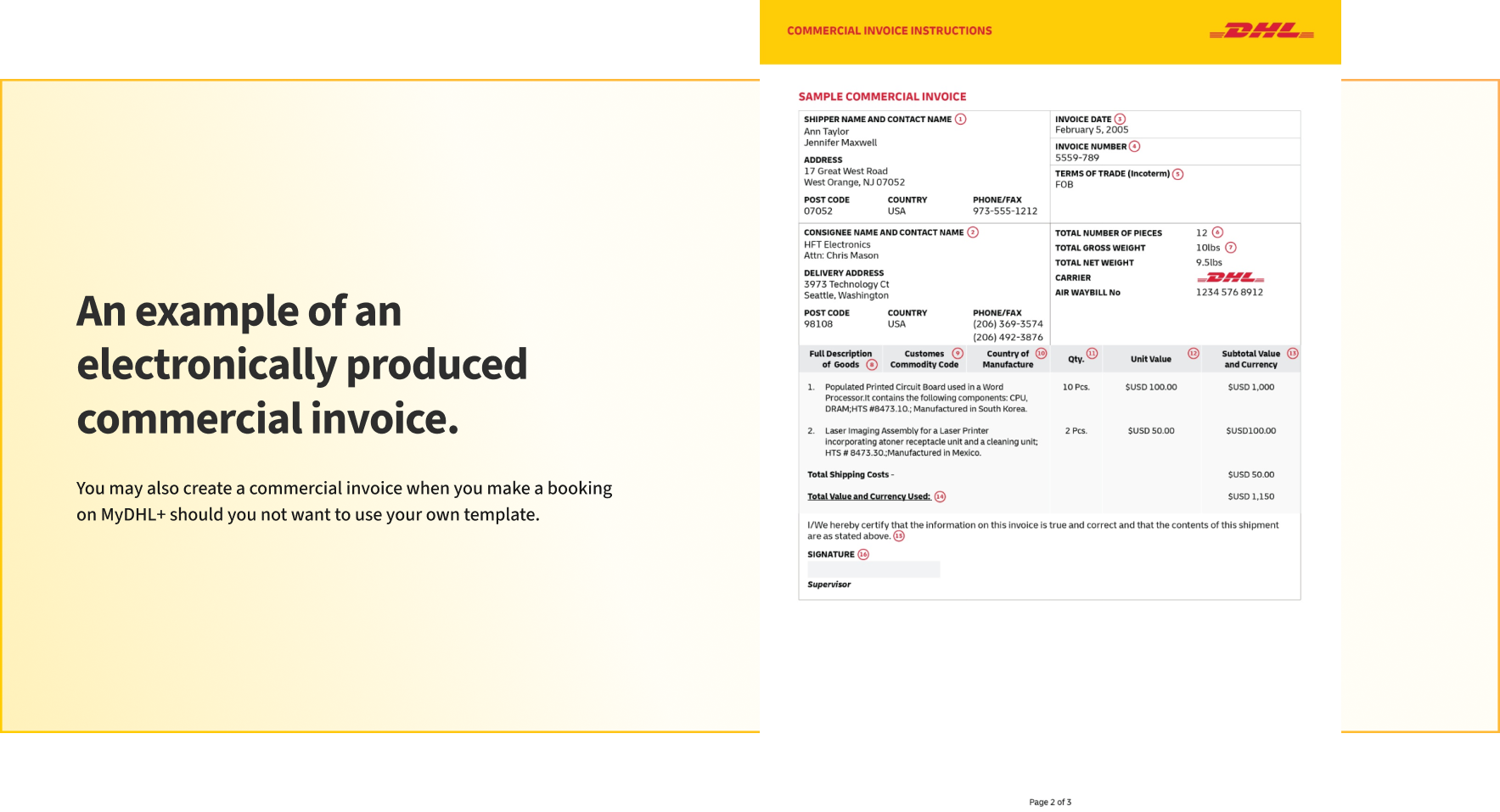
Commercial Invoice
A commercial is required when sending non-document shipments to countries and territories outside your origin country or customs union. This is essentially a declaration containing all the details of a transaction and is used by customs authorities to assess if duties or taxes are payable. A commercial invoice is used when goods are part of a commercial transaction or intended for resale.
Your Commercial Invoice Will Require the Following Details
Seller - The seller's (shipper's) full company name and address, including street address, city, country, post code, and telephone number.
Consignee (Recipient) - Full company name, recipient's name, department, complete address including suite number, telephone number, and fax number.
Invoice Date - Date the invoice is prepared.
Invoice Number - Any invoice number of the sender's choosing
Terms of Trade - They define the buyers' and sellers' risks; e.g., FOB, CIF, EXW.
Total Packages - Indicates the total number of packages in the shipment.
Total Weight - Lists the total weight (kgs) of all packages in the shipment.
Description of Goods - Complete a detailed description of the items being shipped, including the item name, model number, serial and/or part number, reason for shipment (sales samples, returned for repair, gift) what the items are made of, and whether the item is new, used, etc. For example, the description for parts and accessories of communication products (other than covers, carrying cases and the like) shall identify for what machine it is a part, the specific function, where and how it is used, and whether it is shaped to fit a specific machine. If they are Printed Circuit Assemblies (PCAs}, state the function for the PCA, whether populated or bare. If applicable, indicate the kind of components included and whether it contains Memory (type and capacity i.e., DRAM}, CPU, or BIOS. Poorly described shipments will be held by the gateway to obtain detailed information before the presentation of the entry to Customs.
Customs Commodity Code (if known) - This information is optional. If the Customs Commodity Code for the items being shipped are known, they shall be indicated to a six digit level only.
Country of Manufacture - Indicates the country where the goods were grown, produced, or manufactured.
Number of Units/Quantity - Indicates the exact number of units of each item.
Unit Value - Lists the unit value of each item and the currency used to determine the unit of value.
Subtotal Value of Each Item - Determined by multiplying the unit value by the number of units for each item listed.
Total Value - Invoice total value should reflect the shipments fair market or transaction value and the currency used. Fair market or transaction value means the price actually paid or payable for the merchandise.
Declaration of Truth - Indication of validity of the invoice information, i.e., "I/we hereby certify that the information on this invoice is true and correct and that the contents of this shipment are as stated above."
Signature and Title - Signature of sender indicates to U.S. Customs that the sender assumes responsibility for the accuracy of the description of all information on the invoice.
An example of an electronically produced commercial invoice.
You may also create a commercial invoice when you make a booking on MyDHL+should you not want to use your own template.

DHL ELECTRONIC COMMERCIAL INVOICE DATA REQUIREMENT
Regulatory and Customs Authorities across the globe are moving towards a fully data-driven environment. Providing complete and accurate goods line item data is the key enabler for fast and compliant Clearance processes, avoiding delays and fines & penalties.
We want to ensure all our customers are prepared to provide the required level of information to support efficient clearance process.
Ensuring that the Commercial/Proforma Invoice Data you provide is complete and accurate is an essential requirement of Customs Authorities across the globe. Data quality is key to ensure smooth and successful Customs Clearance.
